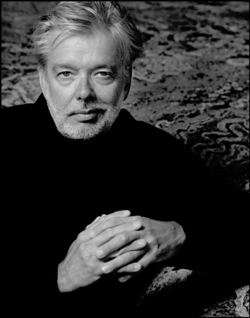|
Back
Jukka-Pekka Saraste Guest Conducts in Montreal Montreal
Maison symphonique de Montréal, Place des Arts
04/20/2016 - & April 21, 2016
André Prévost: Fantasmes
Francis Poulenc: Concerto for Organ, Strings and Timpani in G minor
Dimitri Shostakovitch: Symphony No. 8 in C minor, Op. 65
Olivier Latry (Organ)
Orchestre symphonique de Montréal, Jukka-Pekka Saraste (Conductor)

J.-P. Saraste (© Felix Broede)
Jukka-Pekka Saraste, former conductor of the Toronto Symphony Orchestra and chief conductor of the WDR Symphony Orchestra Cologne, was the guest conductor for the Orchestre symphonique de Montréal (OSM) this week. Saraste, with restrained but detailed gestures, led gratifying performances of three 20th century works—one each from Canada, France and Russia.
When Zubin Mehta was music director in 1963, the OSM commissioned Quebecois composer André Prévost’s Fantasmes. Premiered on the day of President John F. Kennedy’s assassination, November 22, Prévost afterwards wrote on the score—“In memory of John F. Kennedy... victim of the world which I have described in my music.” Indeed, the 11-minute work opens with a hard, cacophonous staccato beat that suggests the brutal beams of mid-Manhattan skyscrapers threatening the existence of man. This is succeeded by a calm centre with a haunting bass bassoon solo drawn over taut ostinato strings, before erupting in wild fury with thumping percussion and wailing brass leading to a tremendous climax. Wednesday evening’s performance was as fresh and relevant as it must have been over 50 years ago. Saraste maintained with a sure hand an exquisitely steady balance among the competing rhythms of the orchestra.
Olivier Latry, organist at Notre-Dame Cathedral in Paris and organist emeritus of the OSM, performed Poulenc’s Organ Concerto at a portable five-keyboard console placed at the forefront of the stage just left of the first violins. Poulenc was a member of the Parisian “Les Six”—a group of composers attempting to overthrow the “pretentions” of Romanticism and Impressionism. In the 1920s he worshiped Stravinsky but underwent a re-conversion to Catholicism in the 1930s which brought about a change in tone to his music. The seriousness of this change was deepened by the sudden death of a friend and fellow composer, Pierre-Octave Ferroud, in a car crash. Writing to Princess Edmond De Polignac, who commissioned the work, Poulenc said: “This is not the amusing Poulenc, but rather Poulenc on his way to the cloister, a fifteenth-century Poulenc.” Latry and the orchestra played together in harmony, rendering a convincing, assured performance of the seven-movement, 22-minute work. Latry rocked the hall with the opening chords after Bach’s Fantasy in G Minor and with the thunderous climax of the final movement. He also brought finesse and delicacy to the softer, solo passages, particularly in the third movement. The strings, with silken sounds from the cellos, glowed throughout.
Shostakovich’s Eighth Symphony is the second of his symphonic “war trilogy.” It is one of his longest works, comprising five movements, and he composed it in only 40 days. Ethan Mordden wrote: “No. 8 is the tragic opus, lacking the glorious defiance of the Seventh and the cheeky recovery of the Ninth. It is a brutalized protest, battered by its own themes and instrumentation to an exhausted close.” The symphony re-incurred the wrath of the Soviet authorities for its “subversiveness” and was banned from performance in the Soviet Union until 1956. Saraste, with the large orchestral forces, evoked with incisiveness and intense concentration the myriad complexities and subtleties of the work. Although the long opening movement meandered somewhat in the middle section before the tremendous climax, and the orchestra sounded raw and unfocussed in the loudest passages, Saraste kept tight control of the rhythmic elements and phrasing, particularly with the march-waltz-march section of the second movement and the piercing, driving tension of the monomaniacal third. The numerous woodwind solos were admirable throughout. Notable in the last movement were André Moisan’s pungent bass clarinet solo and Neil Gripp’s sentimental viola solo rendered with plenty of heart-breaking vibrato.
Earl Arthur Love
|